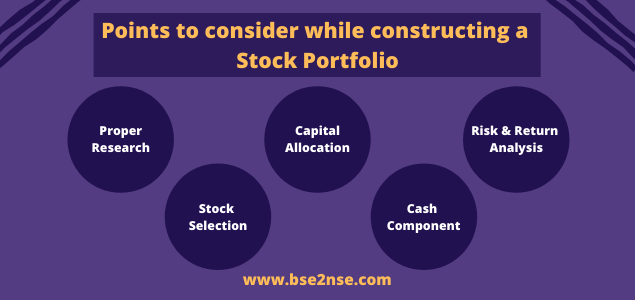Fundamental / Technical Analysis - How to construct a Stock Portfolio? in STRATEGIES & PLANS - A portfolio is a combination of different stocks from the different sectors. Investing can help investors take advantage of compounding ...
-
08-03-2021 05:23 PM

How to construct a Stock Portfolio?

A portfolio is a combination of different stocks from the different sectors. Investing can help investors take advantage of compounding returns and grow the investment amount. The composition of investments in a portfolio depends on a number of factors such as investor's risk tolerance, investment horizon and amount invested.
Investment portfolios and risk tolerance.
One of the most important things to consider when creating a portfolio is your personal risk tolerance. Your risk tolerance is your ability to accept investment losses in exchange for the possibility of earning higher investment returns.
Your risk tolerance is tied not only to how much time you have before your financial goal such as retirement, but also to how you mentally handle watching the market rise and fall. If your goal is many years away, you have more time to ride out those highs and lows, which will let you take advantage of the marketís general upward progression.
ē Proper Research:
It is a better option to follow top down approach to select stocks for building a portfolio. One has to identify the sector that is likely to do well in next decade. This is a qualitative outcome of various factors. Competition, market size, entry barriers, raw material cost impact, regulatory set up are some of the points one need to consider before selecting a sector to invest in. One should not blindly invest into sector without understanding the business. If this goes wrong, even top player in the sector wonít be generating return.
ē Stock Selection:
Once sector is identified, it is always better to stick with sector leaders. One has to remember that, rich get richer. A sector leader with dominant market share and strong balance sheet will be able to withstand a prolonged dull business environment. But small players wonít be able to survive and will get closed. Market share left by such small players will be picked by sector leaders.
ē Capital Allocation:
Even if research on sector identification and stock selection goes wrong, one can have minimal impact on overall portfolio if a proper capital allocation policy is followed. Letís take an example.
Donít allocate more than 25% of capital to a single sector.
Donít allocate more than 10% of capital to a single stock.
Donít allocate more than 5% of capital to a stock that is not a sector leader.
Have atleast 80% of capital allocated to sector leaders.
Stay invested in atleast 5 sectors.
There are instances of many big companies getting collapsed for various reasons. Satyam Computers, Yes Bank and DHFL are some examples. Even if no action was taken by the investor, maximum hit on portfolio will be just 10%, assuming share gets delisted. But most will react at some point. So impact will be less than 10%.
Most of the retail investors who invest directly into stocks, not using Mutual Funds or index ETF, fail to realise the importance of capital allocation. This ensures proper diversification as well.
ē Cash Component:
When deploying cash, one need to have atleast some cash component left behind. There will be opportunities in market that can be utilised for better returns. At that point, one need not look for capital if there is cash balance as part of portfolio. One can deploy such cash in liquid funds and can exit when required so it will earn some returns while not being utilised. Liquidity will help rebalance the portfolio in case of market movements. Rebalancing would help the investors earn better returns.
ē Risk & Return Analysis:
All investments involve some risk, even seemingly "safe" investments. Investors should consider risk taking ability and willingness before committing fund to portfolio because not every asset is suitable for every investor.
To conclude, a well-balanced portfolio with right stocks helps investors earn maximum returns.

Visitors found this page by searching for:
Tags for this Thread






 Register To Reply
Register To Reply